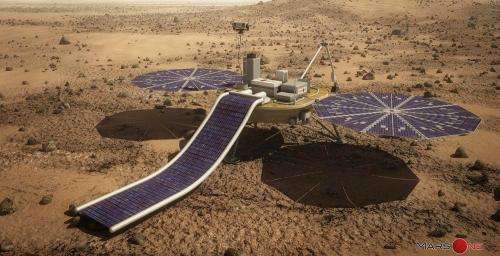Students to send life to Mars onboard Mars One lander in 2018

The first step to establish a permanent colony on Mars could be taken in 2018 when a group of European students will send its project to the Red Planet. The team composed of students from Portugal, Spain and Netherlands has won the Mars One University Competition which offers a one way ticket to Mars for a scientific payload. The winning project which aims to germinate the first seed on the Red Planet, will fly to the surface of Mars onboard the Mars One unmanned lander scheduled to be launched in 2018. "We wanted to perform a useful experiment in order to establish a permanent human colony on the Red Planet before 2030, where any kind of vital support is required," Miguel Valbuena of the Biological Research Centre in Madrid (Spain) and the 'Seed' project team member told astrowatch.net. "Plants could supply oxygen and food, but according to several researches on the International Space Station, plants have trouble to grow in an environment outside Earth. We would like to check in situ the real difficulties for plant development, monitoring the growth of some seeds that in the future could serve as vital support for the first humans on Mars."
The 'Seed' project, selected by popular vote from an initial 35 university proposals, aims to contribute to the development of life support systems and provide a deeper understanding of plant growth on Mars. The payload will consist of an external container, which provides protection from the harsh environment, and interior container, which will hold several seed cassettes. The seeds will stem from the plant Arabidopsis thaliana, which is commonly used in space plant studies. After landing, the seeds inside the cassette will be provided with conditions for germination and seedling growth. The growth will then be recorded using images transmitted back to Earth.
At the end of the experiment, seedling growth will be terminated by deactivating the localized temperature system. To meet the intention of the planetary protection regulations the team will ensure that the flight hardware is sterile and that it remains contained.
"There are some main problems if we want to grow plants on Mars: radiation, temperature, soil and gravity. Radiation is higher than on Earth and, probably, long-term lethal. The thermal oscillation on Mars could be 80ºC between day and night," Valbuena said. "The first evidence, provided by recent NASA exploration missions, does not confirm the fertility of Mars soil, and the light that arrives to the fourth planet in our solar system, could be not enough for the photosynthesis. In addition, gravity, that on Mars is 0,36 times the gravity on Earth, has been studied on the ISS and simulators of weightlessness and its lack produces alterations in plant development and proliferation. In conclusion, we have to change our mind and imagine a garden covered and protected under a greenhouse, isolated from the environment of our neighbor planet."
The team claims that plants are one of the key solutions to contribute for the settlement of a human extraterrestrial base due to their photosynthetic capacity to create oxygen and food and resistance to adverse environments.
'Seed' consists of four bioengineering students from the University of Porto (Portugal) and two PhD students from MIT Portugal and the University of Madrid. The team is supported by Dr. Maria Helena Carvalho, plant researcher at IBMC and Dr. Jack van Loon, from the VU Medical Center, VU-University in Amsterdam (Netherlands). The project benefits from scientific and technical support from several advisers, whose expertise range from biological systems to spacecraft development and validation. "The University of Porto, particularly the Faculty of Engineering is helping with the project, and some tests in microgravity will take place at the VU-University of Amsterdam, simulating part of the environment that the seeds will have in Mars," Valbuena added.
Valbuena acknowledged that it is very gratifying to see that the entire job carried out was worth it. He admitted the win surprised him because they competed against very high-level projects. "Now, we have to come up to the expectations of all the people who supported us," he said.
Dutch organization Mars One plans to establish a permanent human settlement on Mars. The mission, slated for a 2018 launch, will include a robotic lander and a communications satellite. Mars One has contracted Lockheed Martin and Surrey Satellite Technology Ltd. (SSTL) to develop mission concept studies. The Mars lander will be built by Lockheed Martin and the communications satellite will be built by SSTL. This 2018 mission will be a demonstration mission and will provide proof of concept for some of the technologies that are important for a permanent human settlement on Mars.
Source: Astrowatch.net





















